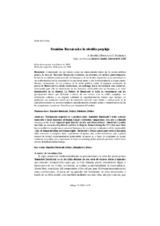Stanisław Barańczak o la rebeldía perpleja
Autor
Benítez Burraco, Antonio
Sobieska, Anna
Editor
UCOPressFecha
2009Materia
Stanisław BarańczakPolítica
Metafísica
Poética
Politics
Metaphysics
Poetics
METS:
Mostrar el registro METSPREMIS:
Mostrar el registro PREMISMetadatos
Mostrar el registro completo del ítemResumen
Considerado en sus inicios como un representante típico de la poesía política polaca, la obra de Stanisław Barańczak constituye, no obstante, un análisis particularmente lúcido de la realidad existencial del ser humano y de los límites impuestos al yo individual en su confrontación con la sociedad de la que forma parte y con la trascendencia a la que aspira. Nacida, ciertamente, de los avatares de la lucha política contra el régimen comunista, la poesía de Barańczak ha sabido evolucionar, sin embargo, hacia un horizonte más universal, acentuando para ello la vindicación de los derechos inalienables del ser humano y el valor irrenunciable de su libertad. La Poética de Barańczak se halla en consonancia con los presupuestos éticos que defiende a través de sus versos: con su estilo complejo, sus referencias cultistas y su original voluntad de experimentación formal (que incluye, en particular, un acentuado interés por la expresión musical como límite o coadyuvante de la expresión poética) su poesía constituye una plasmación siempre actual y siempre personal de las sempiternas cuestiones filosóficas que inquietan al hombre. Traditionally regarded as a political poet, Stanisław Barańczak‟s work actually represents a lucid depiction of human being‟s existential complexities, but also a coherent drawing of the limits imposed upon him by society and transcendence. Barańczak‟s poetry was born on occasion of political conflicts in Popular Poland during the 70‟s, but since then has nevertheless sought more universal horizons, by a coherent vindication of the inalienable value of human freedom and human rights. Barańczak‟s Poetics much more reflects his main ethic concerns: a complex style, a profusion of quotes and cultist references, and a patent interest in formal experimentation (particularly in music as a limit or coadjutant to poetic creation) accurately give expression to those everlasting philosophical questions which have always disturbed human beings.

